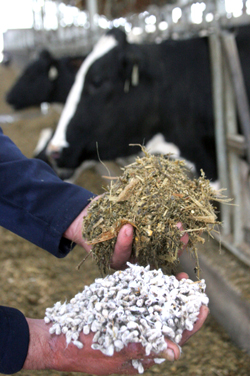Corn, soybeans and hay aren't the only dairy feed staples expected to have more limited supplies this fall. A slightly smaller U.S. cotton crop is also forecast, which means the amount of cottonseed available for dairy rations will be affected.

According to Cotton Incorporated, U.S. cotton farmers planted 14 percent fewer acres in 2012, which is bad enough for dairy producers who like to feed cottonseed. Unknown is what the negative yield effects will be from the current drought in Texas and other major cotton growing states. Of perhaps more concern is an even lower acreage outlook for 2013.
"While a more ‘normal' summer could produce more harvestable acres of cotton and more cottonseed, we anticipate the amount of whole cottonseed available for dairies this year will remain flat compared to 2011," says Tom Wedegaertner, Cotton Inc., director of agricultural research. "I'm fully anticipating a decline in cotton acres next year, given the futures market prices for wheat, soybeans, and corn. Land is being booked up right now to go to those competing crops."
International production of cotton is increasing and is keeping cotton fiber prices down, but it does not affect U.S. cottonseed prices.
Wedegaertner's advice to dairy producers is to keep an eye on the current crop, especially data from the August and September USDA reports, remember that the 2013 crop already looks like it will be even smaller, and watch for cottonseed buying opportunities.

According to Cotton Incorporated, U.S. cotton farmers planted 14 percent fewer acres in 2012, which is bad enough for dairy producers who like to feed cottonseed. Unknown is what the negative yield effects will be from the current drought in Texas and other major cotton growing states. Of perhaps more concern is an even lower acreage outlook for 2013.
"While a more ‘normal' summer could produce more harvestable acres of cotton and more cottonseed, we anticipate the amount of whole cottonseed available for dairies this year will remain flat compared to 2011," says Tom Wedegaertner, Cotton Inc., director of agricultural research. "I'm fully anticipating a decline in cotton acres next year, given the futures market prices for wheat, soybeans, and corn. Land is being booked up right now to go to those competing crops."
International production of cotton is increasing and is keeping cotton fiber prices down, but it does not affect U.S. cottonseed prices.
Wedegaertner's advice to dairy producers is to keep an eye on the current crop, especially data from the August and September USDA reports, remember that the 2013 crop already looks like it will be even smaller, and watch for cottonseed buying opportunities.







